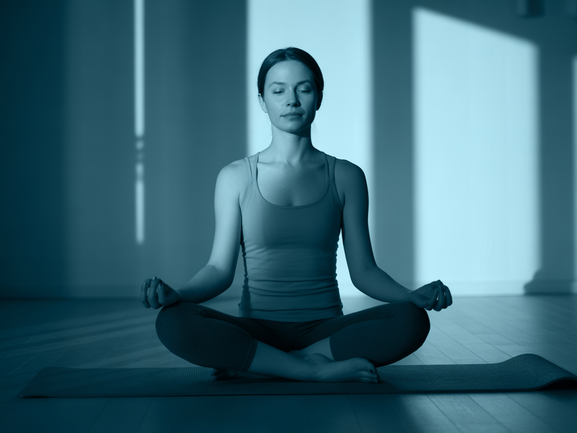Holistic Wellness for Depression: How Yoga and Meditation Create Lasting Mental Health Changes
Living with depression can feel like navigating through a dense fog, where each day presents unique challenges that seem insurmountable. However, emerging research consistently shows that holistic wellness for depression offers a powerful, natural pathway to healing—one that addresses not just symptoms, but the whole person.
<p>While traditional treatments remain important, integrating <em>yoga for mental health</em> and <em>meditation for depression</em> creates a comprehensive approach that can transform your relationship with mental wellness. Moreover, these practices work synergistically to create lasting changes in both brain chemistry and emotional resilience.</p>
<h2>Understanding Holistic Wellness in Depression Recovery</h2>
<p>Holistic wellness recognizes that mental health isn't isolated from physical, emotional, and spiritual well-being. Consequently, addressing depression through <strong>mind-body wellness</strong> practices creates multiple pathways to healing simultaneously.</p>
<p>Research from Harvard Medical School demonstrates that yoga increases GABA levels in the brain—the same neurotransmitter targeted by anti-anxiety medications. Additionally, regular meditation practice has been shown to reduce cortisol levels by up to 23%, providing significant <em>natural depression relief</em>.</p>
<blockquote>
<p>"The body benefits from movement, and the mind benefits from stillness. When we combine both through yoga and meditation, we create optimal conditions for healing." - Dr. Sara Lazar, Harvard Medical School</p>
</blockquote>
<h2>The Neuroscience Behind Yoga and Meditation for Depression</h2>
<p>Understanding how these practices work helps build confidence in their effectiveness. Here's what happens in your brain:</p>
<h3>Neuroplasticity and Depression</h3>
<p>Your brain has an remarkable ability to rewire itself. Through consistent practice, <strong>yoga for mental health</strong> literally reshapes neural pathways associated with mood regulation. Furthermore, meditation strengthens the prefrontal cortex while reducing activity in the amygdala—the brain's fear center.</p>
<ul>
<li><strong>Increased BDNF</strong>: Brain-derived neurotrophic factor promotes new neural growth</li>
<li><strong>Balanced Neurotransmitters</strong>: Natural boost in serotonin, dopamine, and GABA</li>
<li><strong>Reduced Inflammation</strong>: Lower inflammatory markers linked to depression</li>
<li><strong>Improved HRV</strong>: Heart rate variability indicates better stress resilience</li>
</ul>
<h2>5 Evidence-Based Practices to Start Your Healing Journey Today</h2>
<p>These practices form the foundation of <em>holistic wellness for depression</em> and can be easily integrated into your daily routine:</p>
<h3>1. Morning Sun Salutation Sequence</h3>
<p>Start your day with gentle movement that awakens both body and mind. This 10-minute sequence increases circulation and sets a positive tone for the day ahead.</p>
<h3>2. Breathing for Emotional Regulation</h3>
<p>The 4-7-8 breathing technique activates your parasympathetic nervous system. Inhale for 4 counts, hold for 7, exhale for 8. Practice 3-4 cycles whenever you feel overwhelmed.</p>
<h3>3. Mindful Body Scan Meditation</h3>
<p>This practice helps reconnect you with physical sensations and reduces rumination. Spend 15-20 minutes systematically noticing each part of your body without judgment.</p>
<h3>4. Heart-Opening Yoga Poses</h3>
<p>Poses like Camel, Bridge, and Cobra counteract the closed posture depression often creates. These positions literally and figuratively open your heart to healing possibilities.</p>
<h3>5. Evening Gratitude Meditation</h3>
<p>End your day by acknowledging three things you're grateful for, no matter how small. This practice rewires your brain to notice positive experiences more readily.</p>
<h2>Online Yoga Therapy: Breaking Barriers to Healing</h2>
<p>Many people wonder about the effectiveness of <strong>online yoga therapy</strong> compared to in-person classes. Research shows that accessibility often trumps location when it comes to consistent practice—the key factor in seeing results.</p>
<h3>Advantages of Digital Wellness Platforms</h3>
<ul>
<li><strong>Privacy and Comfort</strong>: Practice in your safe space without judgment</li>
<li><strong>Consistency</strong>: No commute time means easier daily practice</li>
<li><strong>Specialized Content</strong>: Access to depression-specific sequences and guidance</li>
<li><strong>Progress Tracking</strong>: Monitor your wellness journey with data insights</li>
</ul>
<p>The <a href="https://vitalizen.app" title="Vitalizen yoga and meditation platform">Vitalizen platform</a> was specifically designed with mental health in mind, offering curated sequences that address the unique needs of those experiencing depression. Additionally, our approach combines ancient wisdom with modern neuroscience for optimal results.</p>
<h2>Creating Your Personal Wellness Routine</h2>
<p>Building sustainable habits requires a gentle, progressive approach. Start with just 10 minutes daily, focusing on consistency rather than perfection. Remember, transformation happens through small, repeated actions.</p>
<p>Consider beginning with our <a href="https://vitalizen.app/start-now" title="Start your wellness journey today">7-day wellness foundation program</a>, specifically designed for those new to <em>mind-body wellness</em> practices. This structured approach provides the support needed to establish lasting habits.</p>
<div id="faqs" itemscope itemtype="https://schema.org/FAQPage">
<h2>Frequently Asked Questions</h2>
Can yoga really help with depression?
Yes, multiple peer-reviewed studies confirm that yoga significantly reduces depression symptoms. A 2017 systematic review found that yoga interventions showed moderate to large effect sizes in reducing depression, comparable to psychotherapy and medication.
How long does it take to see results from yoga and meditation?
Many people notice initial improvements in mood and sleep within 2-3 weeks of consistent practice. However, significant neuroplastic changes typically occur after 8-12 weeks of regular practice. The key is consistency rather than intensity.
<div itemscope itemprop="mainEntity" itemtype="https://schema.org/Question">
<h3 itemprop="name">Is online yoga as effective as in-person classes for depression?</h3>

